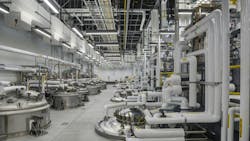Fujifilm Biotechnologies opens $3.2B cell culture manufacturing site in North Carolina
Five years and $3.2 billion in the making, Fujifilm Biotechnologies on Wednesday held the grand opening of its biomanufacturing site in Holly Springs, North Carolina, as the company looks to begin operations later this year.
Touted as one of the largest commercial-scale cell culture manufacturing sites in North America, the Holly Springs facility opens in its first phase with eight 20,000L mammalian cell culture bioreactors for drug product and drug substance manufacturing, with finished goods capabilities to be added in 2026. A second phase of eight 20,000L bioreactors will be added to double capacity — for a total of 16 bioreactors — by 2028.
Fujifilm Biotechnologies, a global contract development and manufacturing organization (CDMO) and subsidiary of Fujifilm Corporation, said it was able to reduce the design time by 70% for the Holly Springs site by leveraging the company’s modular approach — called kojoX — and building a near-replica of its current commercial-scale site in Hillerød, Denmark.
KojoX, the Japanese term for factory and improvement, is meant to harmonize the design of facilities, equipment, processes, and quality systems to ensure that customers can seamlessly integrate manufacturing regardless of location.
“When you manufacture in one facility versus another one, you need to make sure it’s exactly the same,” Lars Petersen, president and CEO of Fujifilm Biotechnologies, told Pharma Manufacturing at Wednesday’s grand opening in Holly Springs.
Amid potential supply chain disruptions from geopolitical tensions such as tariffs, Petersen contends that Fujifilm can move that production — if necessary — between its facilities in Holly Springs and Denmark.
“This facility can do that with the Danish facility through the kojoX right now,” Petersen said. “Act fast, act locally — that is what kojoX is constructed for.”
The first kojoX node in Fujifilm’s network was built in Denmark’s Hillerød, home to a large-scale facility that has been in operation for several years and is the sister site to Holly Springs. In November 2024, Fujifilm announced the completion of the first phase of its expansion at Hillerød including six mammalian cell bioreactors, bringing the total capacity at the site to twelve 20,000L bioreactors. The CDMO said it has leveraged Hillerød’s track record of success and has replicated the model in Holly Springs.
Growing list of customers
In April, Fujifilm Biotechnologies announced a 10-year manufacturing supply agreement worth more than $3 billion with Regeneron Pharmaceuticals to produce the biotechnology company’s biologic medicines. Under the terms of the agreement, the CDMO will provide production services to Regeneron through current and planned expansions at the Holly Springs site.
“There’s a shortage of capacity in the U.S.,” said Daniel Van Plew, executive vice president and general manager of industrial operations and product supply at Regeneron, during a panel session at Wednesday’s grand opening in Holly Springs. “Having access to that capacity is the big part of the solution.”
Last month, Johnson & Johnson announced a $2 billion commitment over 10 years to establish a dedicated facility at Fujifilm’s Holly Springs biomanufacturing site. J&J said the investment in a 160,000-square-foot production plant at the site supports the company’s plans to manufacture most of its advanced medicines domestically.
“Manufacturing this very innovative portfolio is not easy,” said Leila Schwery, vice president of manufacturing and technical operations at J&J Innovative Medicine, during Wednesday’s panel. “That partnership with Fujifilm will also expand our U.S. manufacturing footprint.”
Last week, Fujifilm Biotechnologies announced an expansion of its global partnership with argenx to include U.S. operations. As part of the agreement, Fujifilm will manufacture drug substance for efgartigimod, argenx’s monoclonal antibody fragment, at its Holly Springs facility beginning in 2028. Argenx is the first announced tenant of Fujifilm’s second phase expansion in Holly Springs.
The site encompasses 150 acres, of which 90 acres have been developed, providing the new facility with the ability to expand in the future — if needed — beyond the planned total of 16 20,000L bioreactors with drug products and finished goods capabilities.
Currently, the Holly Springs facility employs over 680 people with plans to reach 750 employees by the end of 2025 and an overall goal of hiring 1,400 by 2031.
About the Author
Greg Slabodkin
Editor in Chief
As Editor in Chief, Greg oversees all aspects of planning, managing and producing the content for Pharma Manufacturing’s print magazines, website, digital products, and in-person events, as well as the daily operations of its editorial team.
For more than 20 years, Greg has covered the healthcare, life sciences, and medical device industries for several trade publications. He is the recipient of a Post-Newsweek Business Information Editorial Excellence Award for his news reporting and a Gold Award for Best Case Study from the American Society of Healthcare Publication Editors. In addition, Greg is a Healthcare Fellow from the Society for Advancing Business Editing and Writing.
When not covering the pharma manufacturing industry, he is an avid Buffalo Bills football fan, likes to kayak and plays guitar.
